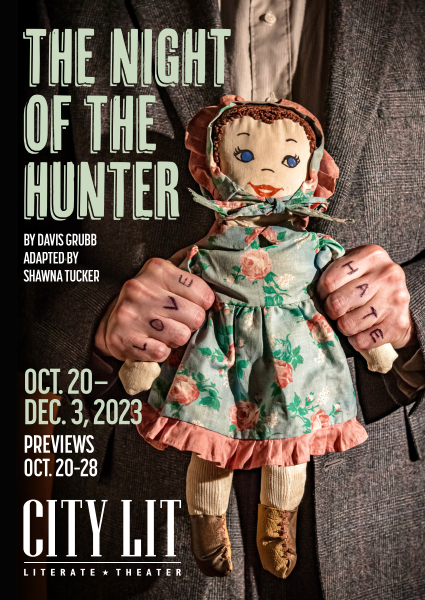
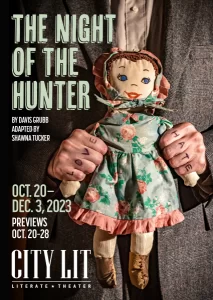 *** Terrific acting by Bryan Breau, in the role of Henry “Preacher” Powell, could not be any better in this world premiere adaptation of the thriller novel “The Night of the Hunter.” Written by Davis Grubb, this story is based on a real murderer in West Virginia, named Harry Powers, who preyed on widows during the Great Depression. The show details how a con artist can fool lots of people into thinking he is actually a good person. Breau takes this sinister role to new heights as he portrays a swarmy ultra-religious Christian preacher who, by means of his sanctimonious piety, inserts himself into the lives of others. In actual fact, he is a hardened criminal with the word LOVE tattooed on his right hand and HATE tattooed on his left.
*** Terrific acting by Bryan Breau, in the role of Henry “Preacher” Powell, could not be any better in this world premiere adaptation of the thriller novel “The Night of the Hunter.” Written by Davis Grubb, this story is based on a real murderer in West Virginia, named Harry Powers, who preyed on widows during the Great Depression. The show details how a con artist can fool lots of people into thinking he is actually a good person. Breau takes this sinister role to new heights as he portrays a swarmy ultra-religious Christian preacher who, by means of his sanctimonious piety, inserts himself into the lives of others. In actual fact, he is a hardened criminal with the word LOVE tattooed on his right hand and HATE tattooed on his left.
The audience learns how Powell meets up with Ben Harper (Alex Albrecht) in prison; and after Harper is hanged for robbery, the preacher develops a wicked scheme to marry Harper’s widow Willa (Kendal Romero) and adopt their ten-year-old son John (Jacqui Touchet) and four-year-old daughter Pearl (Mary Margaret McCormack). Powell is certain that the young children know where their late father has hidden ten thousand dollars of stolen money, and obviously he wants to get his hands on it. The first act is interesting in the frequent use of flashbacks to tell the story, while the second act basically describes the action going forward. The current production, directed by Brian Pastor, is narrated by adapter Shawna Tucker, who also plays the role of Miz Cooper.
The show is wonderful in many ways, because it recounts an interesting tale where the audience understands the extent of Powell’s corruption before most of the characters do. The small-town West Virginians largely see the preacher’s rigidity in his views about religion and morality as being proof of a higher calling. We see how Icey Spoon (Sheila Willis) argues with her husband Walt (Sean Harklerode) about whether Willa should marry the reverend. After all, Willa has two children to raise without a husband, and they lack a father figure. Though Icey and Walt argue about the preacher’s nature, they are nevertheless taken in by his deception. One person who sees through Powell is Uncle Birdie (Rich Cotovsky), but he is a flawed character: He has a good heart but drinks too much.
Touchet is an excellent actor. But at first, when she/he/they took the stage in the role of John, I wondered if the name John could have been short for Johnetta. But when I noticed blue jeans rather a dress (in an era when only boys wore jeans), I decided that more boyish-looking actor should have been cast in the role: either that or Touchet should have worn their hair up, completely hidden by a cap, so as to play the part of a young child convincingly. Although John is a quiet boy, he almost needs to be a bit more vocal at times: stating definitely that he does not like the reverend, because his stepfather will never replace his real father. We need to see his mother or stepfather hit him with the strap (and not just threaten him with it) so as to provide still more motivation to want to escape home.
Also great is McCormack in the role of Pearl; she does a fine job acting as John’s younger sister, especially in how loving she is and how tenacious she holds onto her precious doll Jenny. But, again, some amount of realism dictates that a smaller (and perhaps younger) actor should have been cast instead. Even though McCormack crouches a lot in the course of performing her role, she is nevertheless taller than Touchet. The audience is thus left to our collective imaginations to envision the appropriate older brother/younger sister dynamic.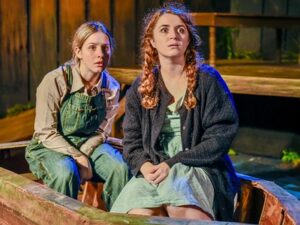
Plus, there are a few too many instances where actors are double cast when it feels odd to see them perform in another role. For example, Albrecht, who once played Ben, becomes another character later on, and we see him play the guitar towards the end. We also see Romero, who previously played Willa, subsequently on stage but now as a child being taken in by Miz Cooper; this is not very believable. In particular, there is some confusion when we watch some of the minor characters. Simmery Branch plays both Ruby and Miz Cunningham. Cotovsky, who mostly plays Uncle Birdie, is also McGlumphy, Abe, and Buddy.
Scenic designer Jeremiah Barr has done a wonderful job in creating a very versatile set that works well to depict exteriors in small town West Virginia as well as interior scenes. The only real issue is that the audience has to imagine the cellar and the cellar door and how the preacher might have escaped. Liz Cooper’s lighting design works well for this show in inserting some amount of creepiness into the script. Paul Chakrin’s violence and movement design is a major asset to the production, as is Petter Wahlback’s sound design and composition. Rachel S. Parent’s costume design is generally appropriate for the era, although a few more costumes and the addition of wig design would have helped to distinguish among actors who play double roles. But above all, Carrie Hardin has done a fantastic job with the West Virginian dialects. The reverend’s manner of speech is as perfect as one could imagine!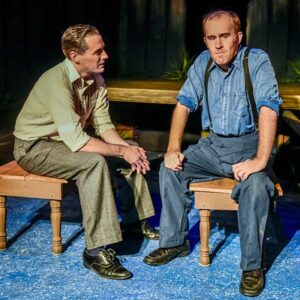
This two-hour-and-twenty-minute presentation could have been shortened by maybe about fifteen minutes. There are spots in the first act that are somewhat slow, and the audience already understands the direction in which things are going. Of course, we’re winding up for the second act, where the story gets more exciting. That said, much of the epilogue could be cut; it is almost too sweet with the addition of the Christmas tree. In a script that is based on terror and fear, some remnants of hard feelings ought to be better played out at the end.
The play leaves the audience with lots of messages. We see how wanting to remain a member of a community can affect a person’s better judgment, whether they are part of a small town or part of a church fellowship or even part of a marriage, where the fear of isolation or excommunication becomes very real. The story also serves a warning about reflexively deferring to those in positions of authority: in this case, deferring to a man who has wrapped himself up in the cloak of superior religious faith when it is actually a cover for immorality and lawlessness. It takes a rare self-possessed individual to see through Powell’s phony righteousness and recognize that evil lurks in the shadows. Moreover, the consequences can be tragic when adults blindly take the side of an authority figure over that of a child without first assessing the character of both or evaluating the truthfulness of what they each have to say. In general, the show makes us examine those circumstances when we should trust another human being and when we should be suspicious of them.
“The Night of the Hunter” is playing through December 3, 2023, at City Lit Theater, 1020 W. Bryn Mawr Avenue, Chicago. (Second floor of the historic Edgewater Presbyterian Church)
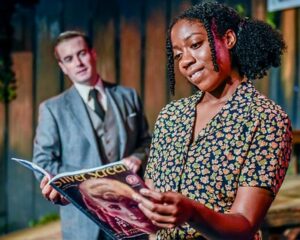 Tickets are $34
Tickets are $34
Seniors $29
Students and military $12
(all plus applicable fees)
Performance schedule:
Fridays and Saturdays at 7:30 p.m.
Sundays at 3:00 p.m.
Mondays November 20 and 27 at 7:30 p.m.
For more information about this show or to purchase tickets, visit https://citylittheater.yapsody.com/event/index/771695?ref=ebtn or phone 773-293-3682.
For general information about City Lit Theater, see https://www.citylit.org/.
Masks are required for all Sunday afternoon performances. They are encouraged for all other shows.
To see what others are saying, visit www.theatreinchicago.com, go to Review Round-Up and click at “The Night of the Hunter”.






More Stories
“Dummy in Diaspora”
“The Magic School Bus: Lost in the Solar System”
“February House” reviewed by Julia W. Rath